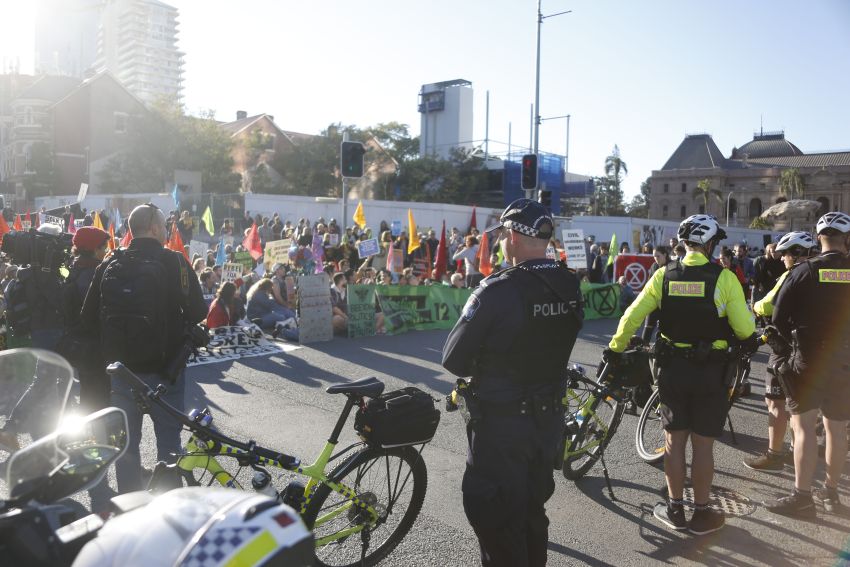
The science has long been in on the climate emergency, yet despite this governments have signed off on Adani’s coalmine in Central Queensland, with five or six more set to follow if it goes ahead.
This immediate threat has led Queensland to become a flashpoint for climate activism in recent months.
Along with refusing to acknowledge the climate and ecological crisis, the state government has threatened to enact tougher protest laws against climate activists.
In response, Extinction Rebellion (XR) activists have taken to the streets, shutting down four significant city intersections in Meanjin/Brisbane on August 6. The Rebellion Day protests saw the arrest of about 90 demonstrators who were willing to put themselves on the line for the cause.
Of those taken into custody, four XR protesters pleaded not guilty to various traffic offences in Brisbane’s Magistrates Court on September 4. When their cases return to court next month, they will put forward the “extraordinary emergency defence”, arguing that the climate crisis justifies breaking the law.
Disrupting business-as-usual
Speaking with Sydney Criminal Lawyers (SCL), Holly Porter, one of the four XR activists set to argue the extraordinary emergency defence, said: “Every day, the business-as-usual that’s continuing in the city is killing us.
“We are in a state of complete emergency. We are seeing this in our own backyard with the fires.
“Four of us decided that we would plead not guilty because climate change is an extraordinary emergency and we believe that we shouldn't be punished for standing up for the future of this planet and all life that exists on it.”
The 22-year-old activist outlined that the defence is valid when a court recognises that an individual broke the law so as to effectively deal with the circumstances arising out of an emergency. Porter explained that a similar defence was successfully used by XR activists in Britain earlier this year.
Along with Porter, activists Emma Dorge, Greg Rolles and Clancey Maher will argue the extraordinary emergency defence in Brisbane’s Magistrates Court on October 22. Rolles argued the defence earlier this year during a previous court appearance in relation to charges over climate activism.
Justified transgression
Section 25 of the Queensland Criminal Code 1899 contains the extraordinary emergency defence, which provides that “a person is not criminally responsible for an act or omission done or made under such circumstances of sudden or extraordinary emergency” if it is a reasonable response.
With the exceptions of NSW and South Australia, this defence is codified in the criminal law of all Australian jurisdictions, including at the federal level.
Southern Cross University Law School senior lecturer Dr Nicole Rogers explained it is a statutory version of the common law defence of necessity, which permits breaking the law under dire circumstances.
Rogers told SCL that the necessity defence “has been around for a couple of hundred of years,'' adding though, “judges don’t like it because it’s a loophole.
“And the bigger the loophole, the more acknowledgement that legal norms are not rock solid.”
Rogers pointed to the 2008 case of the Kingsnorth Six Greenpeace activists in Britain, which saw a jury find a group of climate protesters not guilty of charges relating to £30,000 in damages to a coal-fired power station. The activists argued they were trying to prevent further climate change.
The emergency defence differs from necessity, in that it involves a “sudden or extraordinary emergency,'' Rogers explained.
She said that when Rolles argued it in a Queensland court in May it was unsuccessful, despite an Intergovernmental Panel on Climate Change lead author providing evidence relating to the crisis. “The magistrate completely dismissed the climate evidence and said that it wasn’t relevant to the court’s determination, which I think was inappropriate.”
Climate to shift legal standards
Rogers recently authored Law, Fiction and Activism in a Time of Climate Change, which explores the intersections between the onset of the climate crisis and the narratives of those in the legal profession, fiction authors and activists.
There are two key aspects the XR protesters must address to successfully argue the emergency defence, according to Rogers.
The first is to establish that there is a climate crisis, which she believes is getting easier, as more governments declare that there is one.
“The second part of the defence,” Rogers said, “requires the defendant to demonstrate that an ordinary person, with ordinary powers of self-control would reasonably act as he or she did.”
It is this second aspect that Rogers believes might prove difficult to convince a magistrate of. However, “legal standards of what is reasonable change with time”.
Rogers maintains activists will continue to argue the emergency defence, “because the standard of what is reasonable conduct in the face of climate change is going to shift as increasingly people see the enormous damaging impacts.”
The importance of the extraordinary emergency defence being effectively argued in court, Porter said, is that if the “courts see this as an emergency”, it will be “one step towards our government and all of society seeing the climate crisis as an emergency”.
Rebellion set to heighten
And it is likely that more magistrates will hear this defence argued as climate actions pick up around the country.
About 200 XR activists occupied Melbourne’s Princes Bridge on September 14, disrupting eight key tram routes.
Porter added: “We have an International Rebellion Week, which will be starting on October 7. That will also see continual civil resistance and disruption of business-as-usual, again, until we see action on this crisis.
“And that responsibility lies on every one of us.”
[Paul Gregoire is a Sydney-based journalist and writer for Sydney Criminal Lawyers.]